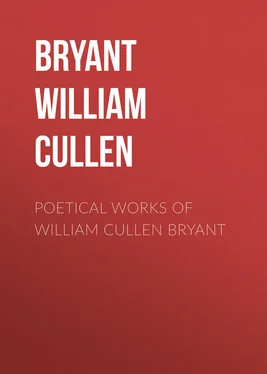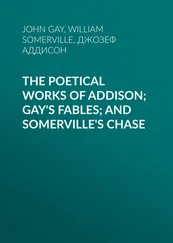William Bryant - Poetical Works of William Cullen Bryant
Здесь есть возможность читать онлайн «William Bryant - Poetical Works of William Cullen Bryant» — ознакомительный отрывок электронной книги совершенно бесплатно, а после прочтения отрывка купить полную версию. В некоторых случаях можно слушать аудио, скачать через торрент в формате fb2 и присутствует краткое содержание. ISBN: , Жанр: foreign_antique, foreign_prose, foreign_poetry, на английском языке. Описание произведения, (предисловие) а так же отзывы посетителей доступны на портале библиотеки ЛибКат.
- Название:Poetical Works of William Cullen Bryant
- Автор:
- Жанр:
- Год:неизвестен
- ISBN:http://www.gutenberg.org/ebooks/29700
- Рейтинг книги:3 / 5. Голосов: 1
-
Избранное:Добавить в избранное
- Отзывы:
-
Ваша оценка:
- 60
- 1
- 2
- 3
- 4
- 5
Poetical Works of William Cullen Bryant: краткое содержание, описание и аннотация
Предлагаем к чтению аннотацию, описание, краткое содержание или предисловие (зависит от того, что написал сам автор книги «Poetical Works of William Cullen Bryant»). Если вы не нашли необходимую информацию о книге — напишите в комментариях, мы постараемся отыскать её.
Poetical Works of William Cullen Bryant — читать онлайн ознакомительный отрывок
Ниже представлен текст книги, разбитый по страницам. Система сохранения места последней прочитанной страницы, позволяет с удобством читать онлайн бесплатно книгу «Poetical Works of William Cullen Bryant», без необходимости каждый раз заново искать на чём Вы остановились. Поставьте закладку, и сможете в любой момент перейти на страницу, на которой закончили чтение.
Интервал:
Закладка:
The early poetical exercises of William Cullen Bryant, like those of all young poets, were colored by the books which he read. Among these were the works of Pope, as I have already intimated, and, no doubt, the works of Cowper and Thomson. The latter, if they were in the library of Dr. Bryant, do not appear to have impressed his son at this time; nor, indeed, does any English poet except Pope, so far as we can judge from his contributions to the Hampshire Gazette , which were continued from time to time. They were bookish and patriotic; one, which was written at Cummington on the 8th of January, 1810, being "The Genius of Columbia;" and another, "An Ode for the Fourth of July, 1812," to the tune of "Ye Gentlemen of England." These productions are undeniably clever, but they are not characteristic of their writer, nor of the nature which surrounded his birthplace, with which he was familiar, and of which he was a close observer, as his poetry was soon to disclose.
He entered Williams College, in Williamstown, Mass., in his sixteenth year, and remained there until 1812, distinguishing himself for aptness and industry in classical learning and polite literature. At the end of two years he withdrew, and commenced the study of law, first with Judge Howe, of Worthington, and afterward with Mr. William Baylies, of Bridgewater. So far he had written nothing but clever amateur verse; but now, in his eighteenth year, he wrote an imperishable poem. The circumstances under which it was composed have been variously stated, but they agree in the main particulars, and are thus given in "The Bryant Homestead Book" (1870), apparently on authentic information: "It was here at Cummington, while wandering in the primeval forests, over the floor of which were scattered the gigantic trunks of fallen trees, mouldering for long years, and suggesting an indefinitely remote antiquity, and where silent rivulets crept along through the carpet of dead leaves, the spoil of thousands of summers, that the poem entitled 'Thanatopsis' was composed. The young poet had read the poems of Kirke White, which, edited by Southey, were published about that time, and a small volume of Southey's miscellaneous poems; and some lines of those authors had kindled his imagination, which, going forth over the face of the inhabitants of the globe, sought to bring under one broad and comprehensive view the destinies of the human race in the present life, and the perpetual rising and passing away of generation after generation who are nourished by the fruits of its soil, and find a resting-place in its bosom." We should like to know what lines in Southey and Kirke White suggested "Thanatopsis," that they might be printed in letters of gold hereafter.
When the young poet quitted Cummington to begin his law studies, he left the manuscript of this incomparable poem among his papers in the house of his father, who found it after his departure. "Here are some lines that our William has been writing," he said to a lady to whom he showed them. She read them, and, raising her eyes to the face of Dr. Bryant, burst into tears – a tribute to the genius of his son in which he was not ashamed to join. Blackstone bade his Muse a long adieu before he turned to wrangling courts and stubborn law; and our young lawyer intended to do the same (for poetry was starvation in America seventy years ago), but habit and nature were too strong for him. There is no difficulty in tracing the succession of his poems, and in a few instances the places where they were written, or with which they concerned themselves. "Thanatopsis," for example, was followed by "The Yellow Violet," which was followed by the "Inscription for the Entrance to a Wood," and the song beginning "Soon as the glazed and gleaming snow." The exquisite lines "To a Waterfowl" were written at Bridgewater, in his twentieth year, where he was still pursuing the study of law, which appears to have been distasteful to him. The concluding stanza sank deeply into a heart that needed its pious lesson:
"He who, from zone to zone,
Guides through the boundless sky thy certain flight,
In the long way that I must tread alone,
Will lead my steps aright. "
The lawyer-poet had a long way before him, but he did not tread it alone; for, after being admitted to the bar in Plymouth, and practising for a time in Plainfield, near Cummington, he removed to Great Barrington, in Berkshire, where he saw the dwelling of the Genevieve of his chilly little "Song," his Genevieve being Miss Frances Fairchild of that beautiful town, whom he married in his twenty-seventh year, and who was the light of his household for nearly half a century. It was to her, the reader may like to know, that he addressed the ideal poem beginning "O fairest of the rural maids" ( circa 1825), "The Future Life" (1837), and "The Life that Is" (1858); and her memory and her loss are tenderly embalmed in one of the most touching of his later poems, "October, 1866."
"Thanatopsis" was sent to the North American Review (whether by its author or his father we are not told), and with such a modest, not to say enigmatical, note of introduction, that its authorship was left in doubt. The Review was managed by a club of young literary gentlemen, who styled themselves "The North American Club," two of whose members, Mr. Richard Henry Dana and Mr. Edward Tyrrel Channing, were considered its editors. Mr. Dana read the poem carefully, and was so surprised at its excellence that he doubted whether it was the production of an American, an opinion in which his associates are understood to have concurred. While they were hesitating about its acceptance, he was told that the writer was a member of the Massachusetts Senate; and, the Senate being then in session, he started immediately from Cambridge for Boston. He reached the State House, and inquired for Senator Bryant. A tall, middle-aged man, with a business-like look, was pointed out to him. He was satisfied that he could not be the poet he sought, so he posted back to Cambridge without an introduction. The story ends here, and rather tamely; for the original narrator forgot, or perhaps never knew, that Dr. Bryant was a member of the Senate, and that it was among the possibilities that he was the Senator with a similar name. American poetry may be said to have commenced in 1817 with the September number of the North American Review , which contained "Thanatopsis" and the "Inscription for the Entrance of a Wood," the last being printed as a "Fragment." Six months later, in March, 1818, the impression which "Thanatopsis" created was strengthened by the appearance of the lines "To a Waterfowl," and the "Version of a Fragment of Simonides."
Mr. Bryant's literary life may now be said to have begun, though he depended upon the practice of his profession for his daily bread. He continued his contributions to the North American Review in the shape of prose papers on literary topics, and maintained the most friendly relations with its conductors; notably so with Mr. Dana, who was seven years his elder, and who possessed, like himself, the accomplishment of verse. At the suggestion of this poetical and critical brother, he was invited to deliver a poem before the Phi Beta Kappa Society at Harvard College – an honor which is offered only to those who have already made a reputation, and are likely to reflect credit on the Society as well as on themselves. He accepted, and in 1821 wrote his first poem of any length, "The Ages," which still remains the best poem of the kind that was ever recited before a college society either in this country or in England; grave, stately, thoughtful, presenting in animated, picturesque stanzas a compact summary of the history of mankind. A young Englishman of twenty-one – Thomas Babington Macaulay – delivered in the same year a poem on "Evening," before the students of Trinity College, Cambridge; and it is instructive to compare his conventional heroics with the spirited Spenserian stanzas of William Cullen Bryant.
Читать дальшеИнтервал:
Закладка:
Похожие книги на «Poetical Works of William Cullen Bryant»
Представляем Вашему вниманию похожие книги на «Poetical Works of William Cullen Bryant» списком для выбора. Мы отобрали схожую по названию и смыслу литературу в надежде предоставить читателям больше вариантов отыскать новые, интересные, ещё непрочитанные произведения.
Обсуждение, отзывы о книге «Poetical Works of William Cullen Bryant» и просто собственные мнения читателей. Оставьте ваши комментарии, напишите, что Вы думаете о произведении, его смысле или главных героях. Укажите что конкретно понравилось, а что нет, и почему Вы так считаете.












